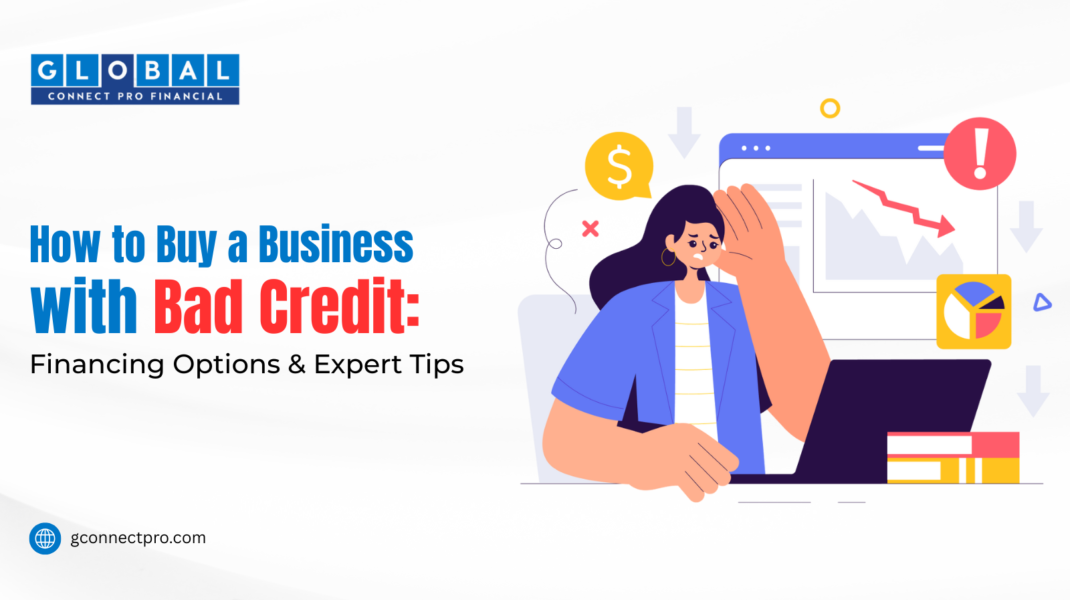How to Buy a Business with Bad Credit: Financing Options & Expert Tips

Buying a business is one of the fastest ways to become your own boss. But if you have bad credit, it can feel like doors are closing before you even begin. The truth? You can still buy a business—even with a poor credit score. The key lies in knowing your financing options and approaching the process strategically. This guide covers how to buy a business with bad credit and what you need to do to make it happen.
Can You Really Buy a Business with Bad Credit?
Yes. While traditional banks may be hesitant, many non-traditional lenders, sellers, and creative financing methods are open to working with buyers who have low credit scores. Instead of focusing solely on credit, they evaluate other factors like your experience, business plan, assets, and the strength of the business you want to acquire.
Step 1: Understand Your Credit Profile
Before diving into financing, take time to check your credit reports and scores from all three bureaus—Equifax, Experian, and TransUnion. Identify what’s hurting your score (e.g., missed payments, high utilization, collections) and dispute any errors.
Small improvements—like reducing debt or paying off collections—can strengthen your financing profile in just a few months.
Step 2: Explore Alternative Financing Options
Traditional business loans aren’t your only option. Here are several alternatives better suited to buyers with bad credit:
A. Seller Financing
Also known as owner financing, this allows the seller to act as the lender. You make a down payment and repay the remaining balance over time. It’s one of the most flexible ways to buy a business with poor credit.
B. Asset-Based Loans
These loans are secured using the assets of the business—like inventory, equipment, or receivables. Since the loan is collateral-backed, your credit score carries less weight.
C. Microloans & CDFIs
Community Development Financial Institutions and microlenders often work with borrowers who don’t qualify for traditional loans. They offer smaller loan amounts with flexible requirements.
D. Use a Business Partner or Co-Signer
Bringing in a co-buyer with better credit or capital can make your deal stronger and help you qualify for larger loans at better terms.
E. Rollover for Business Startups (ROBS)
If you have retirement savings, you may be able to roll over those funds to finance a business without penalties or taxes. This IRS-compliant method is known as ROBS.
F. Merchant Cash Advances or Revenue-Based Financing
If the business has strong, predictable income, you can get an advance on future sales. While the interest rates are higher, credit requirements are usually more lenient.
Step 3: Strengthen the Rest of Your Application
When your credit is weak, you’ll need to shine in other areas:
- Business Plan: A detailed, realistic business plan shows that you understand the risks and have a roadmap to profitability.
- Industry Experience: Highlight any relevant operational or managerial experience.
- Down Payment: The more you can put down, the more confidence lenders or sellers will have.
- Strong Cash Flow: A business with stable, recurring income is more attractive to lenders—even if you’re not.
Step 4: Consider SBA Loans—Strategically
While SBA loans usually require good credit, you may still qualify if:
- You apply with a guarantor or co-signer
- You offer valuable collateral
- The business itself is financially strong
Some SBA lenders are more flexible than others, especially when there’s solid business documentation and a low-risk acquisition.
Step 5: Negotiate Directly with the Seller
Not every transaction needs bank financing. Sellers often agree to customized payment plans, especially if:
- The business has been on the market for a while
- You show genuine interest and preparedness
- You’re willing to make a larger upfront payment
Negotiating a deal directly with the seller gives you more control and may reduce the need for external funding entirely.
Step 6: Improve Your Credit Over Time
Even as you pursue funding, take steps to build your credit:
- Pay down existing debt
- Dispute errors on your credit report
- Establish trade lines in your business’s name once acquired
This will make future financing easier and cheaper.
Final Thoughts
Buying a business with bad credit is challenging—but entirely possible. With creative financing, negotiation skills, and a strong business case, you can overcome credit barriers and become a successful business owner. The journey might take extra effort, but the reward—owning your own business—is well worth it.

